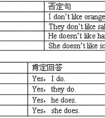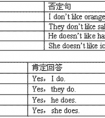句型转换。1.We were happy yesterday.(同义句)We_____________yesterday.2.Amy has 5pencils. Simon has 6 pencils.(合并成一句)Amy has ______pencils______Simon.-八年级英语
dare, need 为实义动词 do/don't +主语
省去主语的祈使句 will/won't you?
Let's 开头的祈使句 Shall we?
Let us 开头的祈使句 Will you?
there be 相应的谓语动词+there(省略主语代词)
否定前缀不能视为否定词 仍用否定形式.
1) 陈述部分的主语是I,疑问部分要用 aren't I.
I'm as tall as your sister,aren't I?
2) 陈述部分的谓语是wish,疑问部分要用may +主语。
I wish to have a word with you, may I?
3) 陈述部分用 no, nothing, nobody, never, few, seldom, hardly, rarely, little等否定含义的词时,疑问部分用肯定含义。
The Swede made no answer, did he / she?
Some plants never blown (开花), do they ?
4) 含有ought to 的反意疑问句,陈述部分是肯定的,疑问部分用shouldn't / oughtn't +主语。
He ought to know what to do, oughtn't he? / shouldn't he?
5) 陈述部分有have to +v. (had to + v.),疑问部分常用don't +主语(didn't +主语)。
We have to get there at eight tomorrow, don't we?
6) 陈述部分的谓语是used to 时,疑问部分用didn't +主语或 usedn't +主语。
He used to take pictures there, didn't he? / usedn't he?
7) 陈述部分有had better + v. 疑问句部分用hadn't you?
You'd better read it by yourself, hadn't you?
8) 陈述部分有would rather +v.,疑问部分多用 wouldn't +主语。
He would rather read it ten times than recite it, wouldn't he?
9) 陈述部分有You'd like to +v. 疑问部分用wouldn't +主语。
You'd like to go with me, wouldn't you?
10) 陈述部分有must 的疑问句,疑问部分根据实际情况而定。
He must be a doctor, isn't he?
You must have studied English for three years, haven't you? / didn't you?
He must have finished it yesterday, didn't he?
11) 感叹句中,疑问部分用用否定的助动词加sb/sth?如:
1)What a fine day it is today!
What a fine day it is today,isn“t it?
2)How fast he runs!
How fast he runs,doesn”t he?
3)What a long time we have been waiting!
What a long time we have been waiting ,haven“t we?
12) 陈述部分由neither… nor, either… or 连接的并列主语时,疑问部分根据其实际逻辑意义而定。
Neither you nor I am engineer, are we?
13) 陈述部分主语是指示代词或不定代词everything, that, nothing, this, 疑问部分主语用it。
Everything is ready, isn't it?
14)陈述部分为主语从句或并列复合句,疑问部分有三种情况:
a. 并列复合句疑问部分,谓语动词根据邻近从句的谓语而定。
Mr. Smith had been to Beijing for several times, he should have been in China now, shouldn't he?
b. 带有定语从句,宾语从句的主从复合句,疑问部分谓语根据主句的谓语而定:
He is not the man who gave us a talk, is he?
He said he wanted to visit Japan, didn't he?
c. 上述部分主句谓语是think, believe, expect, suppose, imagine等引导的定语从句,疑问部分与宾语从句相对应构成反意疑问句。
I don't think he is bright, is he?
We believe she can do it better, can't she?
15) 陈述部分主语是不定代词everybody, anyone, somebody, nobody, no one等,疑问部分常用复数they,有时也用单数he。
Everyone knows the answer, don't they? (does he?)
Nobody knows about it, do they? (does he?)
16) 带情态动词dare或need的反意疑问句,疑问部分常用 need (dare ) +主语。
We need not do it again, need we ?
He dare not say so, dare you?
当dare, need 为实义动词时,疑问部分用助动词do + 主语。
She doesn't dare to go home alone, does she?
17) 省去主语的祈使句的反意疑问句,疑问部分用will you。
Don't do that again, will you?
Go with me, will you / won't you ?
注意: Let's 开头的祈使句,后用shall we?
Let us 开头的祈使句,后用will you?
Let's go and listen to the music, shall we?
Let us wait for you in the reading-room, will you ?
18) 陈述部分是"there be"结构的,疑问部分用there省略主语代词。
There is something wrong with your watch, isn't there?
There will not be any trouble, will there?
19) 否定前缀不能视为否定词,其反意疑问句仍用否定形式。
It is impossible, isn't it?
He is not unkind to his classmates, is he?
有些动词如:cost hurt hit put 等,它们的过去时与原型相同,在肯定句中一定要先弄清楚它们是什么时态.
1.祈使句。祈使句后一般加上will you或won't you构成反意疑问句,用will you 多表
示“请求”,用won't you 多表示提醒对方注意。例如:
Look at the blackboard, will you/ won't you?看黑板,好吗?
Let 引导的祈使句有两种情况:
1) Let's...后的反意疑问句用shall we或shan't we。例如:
Let's go home, shall we/ shan't we? 回家吧,好吗?
还可以用may I来表示征求对方的同意或许可。
2) Let us/me...后的反意疑问句用will you或won't you。例如:
Let me have a try, will you/won't you? 让我试一试,行吗?
2. 感叹句。感叹句后加反意疑问句时,其反意疑问句需用be的一般现在时态的否定形式。 例如:
What fine weather, isn't it? 多好的天气啊,是吧?
3. 当陈述部分谓语动词是need, dare, used to,且这些词被用作实义动词时,其反意疑问 句需用do的适当形式。例如:
He needs help, doesn't he? 他需要帮助,是吗?
4. 陈述部分主、谓语是I am...时,反意疑问句用aren't I 或am't I ,而不是am not I (可 用a m I not)。例如:
I'm working now, am't I? 我在工作,是吗?
5. 陈述部分的主语是everything, nothing, anything或something 时,反意疑问句的主语应用代词it。例如:
Something is wrong with my radio, isn't it? 我的收音机出毛病了,是吧?
6. 陈述部分的主语是 everybody, everyone, anybody, anyone, somebody, someone, nobody, no one, none, neither 时, 其反意疑问句的主语需用复数代词they。 例如:
Everyone is here, aren't they? 大家都到了,是吗?
No one knows about it, do they? 没有人知道这件事,对吗?
7. 陈述部分的主语是指示代词this或that时,反意疑问句的主语用it,当陈述部分的主语是指示代词these或those时,其反意疑问句的主语用they。 例如:
This is a plane, isn't it? 这是一架飞机,是吗?
These are grapes,aren't they? 这些是葡萄,是吗?
8. 陈述部分的主语是不定代词one时,反意疑问句的主语可以用one,也可用you(美式英语用he)。例如:
One should be ready to help others, shouldn't one? 每个人都应该乐于助人,是吧?
9. 当陈述部分含有以下这些含有否定意义的词时:few, little, seldom,hardly, never, not, no, no one, nobody, nothing, none, neither等,其反意疑问句需用肯定结构。 例如:
He is never late for school, is he? 他上学从不迟到,是吗?
10. 当陈述部分所含的否定词是通过加前缀或后缀构成的,其后的反意疑问句依然用否定结构。例如:
It is unfair, isn't it? 这不公平,是吧?
11.含有否定含义的词在陈述部分作动词的宾语时,其反意疑问句用肯定结构,也可以用否定结构。例如:
You got nothing from him, did you? 你从他那儿什么也没得到,是吗?
12. 当陈述部分主语是从句、不定式(短语)、动词-ing形式时,反意疑问句的主语应该用it。 例如:
What you need is more important, isn't it?你需要的东西更重要,是吧?
13. 当陈述部分含I think (believe, suppose...)that... 结构时,其反意疑问句须与从句的主、谓语保持一致,注意主句的主语必须是第一人称。例如:
I don't think he will come, will he? 我认为他不会来,对吗?
14.have(has)不是表示“有”的意思,并在句中做谓语时,其反意疑问句的助动词要用do, does, did。例如:
They had a meeting just now,didn't they? 他们刚才开了个会,是吗?
15. 陈述部分有have to 时,其反意疑问句要用助动词的否定形式。例如:
You have to water the vegetables every day, don't you?你每天都要浇菜,对吧?
16. 陈述部分是there be句型时,其反意疑问句中要用there。例如:
There was a hospital here, wasn't there? 过去这儿有家医院,是吗?
17. 陈述部分有had better时,反意疑问句中要用hadn't。 例如:
We had better go to school at once, hadn't we? 我们现在最好马上去上学,好吗?
18. 当陈述部分含有情态动词must时,我们便要分析一下must的含义。如果must 作“一定;要;必须”讲,反意疑问句须用mustn't或needn't;
- 最新内容
- 相关内容
- 网友推荐
- 图文推荐
上一篇:—We'll go to plant trees next week. —Great! Planting trees is great fun. I'd like to ______ you.[ ]A. follow B. visit C. inviteD. meet-八年级英语
下一篇:You must remember that you ______ feed the fish much. [ ]A. don't need toB. needn't toC. don't needD. not need-八年级英语
零零教育社区:论坛热帖子
| [家长教育] 孩子为什么会和父母感情疏离? (2019-07-14) |
| [教师分享] 给远方姐姐的一封信 (2018-11-07) |
| [教师分享] 伸缩门 (2018-11-07) |
| [教师分享] 回家乡 (2018-11-07) |
| [教师分享] 是风味也是人间 (2018-11-07) |
| [教师分享] 一句格言的启示 (2018-11-07) |
| [教师分享] 无规矩不成方圆 (2018-11-07) |
| [教师分享] 第十届全国教育名家论坛有感(二) (2018-11-07) |
| [教师分享] 贪玩的小狗 (2018-11-07) |
| [教师分享] 未命名文章 (2018-11-07) |


![How much does it ______ to fly from Yancheng to Hainan Island?[ ]A. cost B. payC. spend D. take-七年级英语](http://www.00-edu.com/d/file/ks/4/2/shiyidongci/2020-01-05/small7dcf2f05998de63e10cc3629787031c81578210087.png)

![He always _____TV in the evening. He _____ listening to the radio. [ ]A. watch, don't like B. watches, doesn't like C. watching, don't like D. watch, do-七年级英语](http://www.00-edu.com/d/file/ks/4/2/shiyidongci/2020-01-05/small45d599b4a60b84e61cec210bfbf051f51578214524.png)
![I'd rather ___ to the Mcdonald's Restaurant because I like to listen to quiet music.[ ]A. to go B. going C. go D. went-八年级英语](http://www.00-edu.com/d/file/ks/4/2/shiyidongci/2020-01-05/small1767bba1727fef2c035c53dcbd9bc20e1578209517.png)
